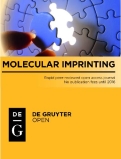|
|
Reference type: Journal
Authors: Cormack PAG, Mehamod FS
Article Title: Molecularly imprinted polymer synthesis using RAFT polymerisation.
Publication date: 2013
Journal: Sains Malaysiana
Volume: 42
Issue: (4)
Page numbers: 529-535.
Alternative URL: http://www.ukm.my/jsm/pdf_files/SM-PDF-42-4-2013/15%20Peter.pdf
Abstract: In this paper, the synthesis and characterisation of caffeine-imprinted polymers are described. The polymers were prepared in monolithic form via both reversible addition-fragmentation chain-transfer (RAFT) polymerisation and conventional free radical polymerisation, using methacrylic acid and ethylene glycol dimethacrylate as the functional monomer and crosslinking agent, respectively. The potential benefits in applying RAFT polymerisation techniques towards the synthesis of molecularly imprinted polymers (MIPs) are explored and elucidated. The pore structures of the polymers produced were characterised by nitrogen sorption porosimetry and the molecular recognition properties of representative products were evaluated in high-performance liquid chromatography (HPLC) mode. Molecular imprinting effects were confirmed by analysing the relative retentions of analytes on imprinted and non-imprinted HPLC stationary phases. It was found that a caffeine-imprinted polymer synthesised by RAFT polymerisation was superior to a polymer prepared using a conventional synthetic approach; the imprinting factor and column efficiency were found to be higher for the former material
Template and target information: caffeine
Author keywords: caffeine, molecular recognition, Molecularly imprinted polymers, Novel stationary phases, RAFT polymerisation
|


 SMI logo T-shirt
SMI logo T-shirt







 Postcard with view of Himeji Castle
Postcard with view of Himeji Castle







 Himeji castle Japan magnet
Himeji castle Japan magnet






